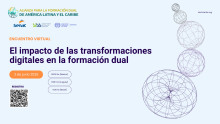The Alliance for Dual Training Promotes the Debate on Artificial Intelligence and Vocational Education in Latin America and the Caribbean
On 3 June, the virtual seminar “The Impact of Digital Transformations on Dual Training” was held, bringing together over 200 participants from across the region.
The opening remarks were delivered by Kelly Teixeira from the National Department of SENAC Brazil, who emphasised the relevance of the topic and reaffirmed the institution’s commitment to digital transformation processes in vocational education and training. Representing ILO/Cinterfor, Gonzalo Graña welcomed participants on behalf of Director Elena Montobbio, highlighting the importance of these spaces in strengthening the link between vocational training and the world of work in a context of accelerated digitalisation.
Ilona Medrikat from the Federal Institute for Vocational Education and Training (BIBB) in Germany introduced the first speaker, Dr Inken Rabbel, Deputy Head of the Training and International Cooperation Department of the German Association for Water, Wastewater and Waste (DWA). Rabbel shared the experience of the pilot project “Azukit”, an innovative initiative using artificial intelligence to support the training of environmental technologists in Germany through a virtual tutor capable of identifying knowledge gaps and suggesting personalised learning content.
From Brazil, Arthur William Santos, Supervisor of Educational Technologies at SENAC’s National Department, presented the institution’s progress in integrating artificial intelligence into vocational education. He showcased conversational simulators that allow students to practise skills in realistic settings, and explained the development of AI tools that assist teachers in lesson planning. He emphasised that these developments are aligned with SENAC’s pedagogical model and guided by its principles for the ethical and responsible use of artificial intelligence.
During the discussion segment, key topics were addressed, including the reliability of AI-based tools, their integration into teaching practice, the protection of students’ personal data, and the impact of these technologies on curriculum updates. Speakers agreed on the need for clear regulations and the active involvement of educators in these innovation processes.
The event also served as an opportunity to share recent experiences of the Alliance in international settings, such as SENAC’s participation in UNESCO-UNEVOC’s BILT (Bridging Innovation and Learning in TVET) forum held in Kuala Lumpur, where the contribution of Latin America and the Caribbean to the digital transformation of technical and vocational education was highlighted.
The next videoconference of the Alliance will take place on 26 June, as part of an annual agenda aimed at strengthening dual training in Latin America and the Caribbean through knowledge exchange, best practices, and institutional cooperation.





